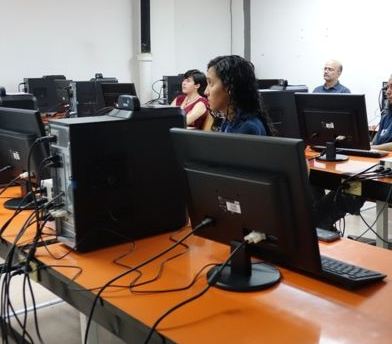Development of research skills during the Student Community Service: Nueva Esparta. Venezuela, 2015-2016
Keywords:
MEDICAL EDUCATION, PROFESSIONAL EDUCATION, BIOMEDICAL RESEARCH.Abstract
Introduction: the General Training Program of the Comprehensive Community Physician (GTPCCP) in the Bolivarian Republic of Venezuela aims to guarantee the training of physicians called to renovate health care services. During the sixth academic years, students perform the community intervention project, which requires research skills.
Objective: to implement a system of actions and operations for the development of research skills in sixth-academic year students of Comprehensive Community Medicine.
Method: a pedagogical research, with a qualitative approach was conducted from January 2015 to January 2016 in the state of Nueva Esparta, Venezuela. The sample coincided with the target group, 36 sixth-year students, and seven teaching advisors of the Community Comprehensive Health Areas and the 12 tutors of the research teams.
Results: the experience is presented on the succession of actions and operations systematically interrelated, and it has a specific characterization in the research process by allowing students to progressively and comprehensively acquire the efficient modes of action in an independent and creative way; improving interpersonal communication, feelings of cooperation, along with the potentials of teamwork that were developed supported on the tutor’s guidance.
Conclusions: the systematization of the actions and operations in the consultancies enabled the students to progressively and comprehensively acquire efficient modes of action for the development of research skills in an independent and creative way and to develop the potential of teamwork.
Downloads
References
1. Borroto Cruz ER, Salas Perea R.S. Programa Nacional de Formación en Medicina Integral Comunitaria, Venezuela. Medicina Social [Internet] 2008 [citado 26 Jun 2017]; 3(4). Disponible en: http://www.socialmedicine.info/index.php/medicinasocial/article/view/261/535
2. Ley de Servicio Comunitario del Estudiante de Educación Superior. La asamblea nacional de la República Bolivariana de Venezuela. Gaceta Oficial Nº 38.272. (Sep 14; 2005)
3. Madiedo M, Escobar E, Puga A, Pérez AV. Fundamentos teóricos del tratamiento didáctico de los objetivos para la formación de habilidades intelectuales y prácticas en la Carrera de Medicina. Educ Med Sup [Internet] 2011 [citado 26 Jun 2017]; 25(2): [Aprox. 21p.]. Disponible en: http://scielo.sld.cu/scielo.php?script=sci_arttext&pid=S0864-21412011000200011&lng=es
4. Pérez M, González O, Rodríguez M, Zayas M. Contribución de la disciplina Farmacología al desarrollo de habilidades investigativas en estudiantes de Medicina. Edumecentro. [Internet] 2011 [citado 26 Jun 2017]; 3(2): [Aprox. 8 p.]. Disponible en: http://revedumecentro.sld.cu/index.php/edumc/article/view/122/247
5. Herrera Miranda GL, Horta Muñoz DM. El proceso de formación de habilidades investigativas en estudiantes de Medicina mediante el método clínico. Rev. Ciencias Médicas de Pinar del Río. [Internet] mar. 2016 [citado 26 Jun 2017]; 20(1): [Aprox. 10p.]. Disponible en: http://www.revcmpinar.sld.cu/index.php/publicaciones/article/view/2352/pdf
6. Herrera Miranda GL. Concepción pedagógica del proceso de formación de habilidades investigativas. Rev. Ciencias Médicas de Pinar del Río. [Internet] ago. 2014 [citado 26 Jun 2017]; 18(4): [Aprox. 12p.]. Disponible en: http://www.revcmpinar.sld.cu/index.php/publicaciones/article/view/1528
7. Fernández JA. El principio rector de la Educación Médica cubana. Educ Med Sup [Internet] 2013 [citado 26 Jun 2017]; 27(2): [Aprox. 7p.]. Disponible en: http://www.ems.sld.cu/index.php/ems/article/view/170/94
8. Salas Perea RS, Salas Mainegra A. La educación en el trabajo y el individuo como principal recurso para el aprendizaje. Edumecentro [Internet] 2014 [citado 26 Jun 2017]; 6(1): [Aprox. 18p.]. Disponible en: http://scielo.sld.cu/scielo.php?script=sci_arttext&pid=S2077-28742014000100002
9. Cabieses B, Bernales M. El potencial de las variables latentes investigación en Salud. Rev Med Chile [Internet]. 2015 [citado 30 Jul 2015]; 143(6). Disponible en: https://scielo.conicyt.cl/scielo.php?script=sci_arttext&pid=S0034-98872015000600019
10. Facultad de Humanidades y Ciencias de la Educación. Reflexiones metodológicas situadas en torno a los procesos de investigación [Internet]. La Plata: Universidad Nacional de La Plata; 2015 [citado 26 Jun 2017]. Disponible en: https://www.libros.fahce.unlp.edu.ar/index.php/libros/catalog/book/52
11. Salas Perea RS, Salas Mainegra A. Los modos de actuación profesional y su papel en la formación del médico. Edumecentro [Internet] 2014 [citado 21 jul 2017]; 6(2): [Aprox. 18p.]. Disponible en: http://scielo.sld.cu/scielo.php?script=sci_arttext&pid=S2077-28742014000200002

Published
How to Cite
Issue
Section
License
Authors who have publications with this journal agree to the following terms: Authors will retain their copyrights and grant the journal the right of first publication of their work, which will be publication of their work, which will be simultaneously subject to the Creative Commons Attribution License (CC-BY-NC 4.0) that allows third parties to share the work as long as its author and first publication in this journal are indicated.
Authors may adopt other non-exclusive license agreements for distribution of the published version of the work (e.g.: deposit it in an institutional telematic archive or publish it in a volume). Likewise, and according to the recommendations of the Medical Sciences Editorial (ECIMED), authors must declare in each article their contribution according to the CRediT taxonomy (contributor roles). This taxonomy includes 14 roles, which can be used to represent the tasks typically performed by contributors in scientific academic production. It should be consulted in monograph) whenever initial publication in this journal is indicated. Authors are allowed and encouraged to disseminate their work through the Internet (e.g., in institutional telematic archives or on their web page) before and during the submission process, which may produce interesting exchanges and increase citations of the published work. (See The effect of open access). https://casrai.org/credit/


